英语介词的用法
40个英语介词用法总结
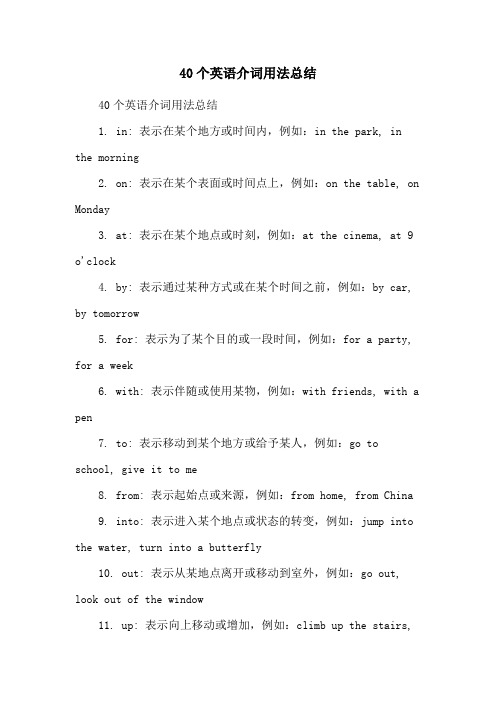
40个英语介词用法总结40个英语介词用法总结1. in: 表示在某个地方或时间内,例如:in the park, in the morning2. on: 表示在某个表面或时间点上,例如:on the table, on Monday3. at: 表示在某个地点或时刻,例如:at the cinema, at 9 o'clock4. by: 表示通过某种方式或在某个时间之前,例如:by car, by tomorrow5. for: 表示为了某个目的或一段时间,例如:for a party, for a week6. with: 表示伴随或使用某物,例如:with friends, with a pen7. to: 表示移动到某个地方或给予某人,例如:go to school, give it to me8. from: 表示起始点或来源,例如:from home, from China9. into: 表示进入某个地点或状态的转变,例如:jump into the water, turn into a butterfly10. out: 表示从某地点离开或移动到室外,例如:go out, look out of the window11. up: 表示向上移动或增加,例如:climb up the stairs,wake up12. down: 表示向下移动或减少,例如:walk down the hill, calm down13. about: 表示关于某事或在某个范围内,例如:talk about the movie, wander about the city14. off: 表示离开或关闭,例如:get off the bus, turnoff the lights15. on: 表示打开或激活,例如:turn on the TV, switch on the computer16. over: 表示越过或在某地上方,例如:jump over the fence, fly over the city17. under: 表示在某物下面或被控制或影响,例如:hide under the bed, live under his rules18. with: 表示具有某种特征或和某人一起做某事,例如:a man with blue eyes, dance with me19. without: 表示没有某物或在缺乏某物的情况下,例如:go without food, live without regret20. by: 表示通过某种方式,例如:learn by doing, go by bus21. through: 表示穿过某物或完成某事,例如:walk through the door, go through the documents22. across: 表示横穿某物或在某个范围内,例如:swimacross the river, all across the world23. between: 表示在两个事物之间或在某个时间段,例如:choose between two options, between 9 and 10 o'clock24. among: 表示在三个或三个以上事物之间或在某群人中,例如:share among friends, discuss among colleagues25. around: 表示在周围或在某个时间点附近,例如:walk around the park, around midnight26. through: 表示通过某事物或在某段时间内,例如:read through the book, work through the night27. against: 表示反对或靠在某物上,例如:fight against injustice, lean against the wall28. for: 表示代表或支持某人或某事,例如:vote for a candidate, fight for freedom29. towards: 表示朝向某个方向或对某人有好感,例如:walk towards the beach, feel towards someone30. within: 表示在某个时间或范围内,例如:arrive within an hour, within the city limits31. beyond: 表示超出某个界限或超过某个程度,例如:beyond expectations, beyond the horizon32. along: 表示沿着某个路线或伴随某人一起,例如:walk along the street, sing along with the song33. above: 表示在某物之上或高于某个程度,例如:flyabove the clouds, above average34. below: 表示在某物之下或低于某个程度,例如:swim below the surface, below freezing35. beside: 表示在某物旁边或和某人一起,例如:sit beside me, beside the lake36. near: 表示在某物附近或接近某个时间,例如:live near the beach, near the end37. past: 表示经过某个地点或在某个时间之后,例如:walk past the store, past midnight38. around: 表示在周围或大约某个数量,例如:look around the room, around 20 people39. after: 表示在某个时间之后或追求某人或某事,例如:after dinner, run after the dog40. before: 表示在某个时间之前或在某个事件之前,例如:before sunrise, before the meeting这些介词是英语中常用的一些基本介词,它们在表达地点、时间、方式等方面起到了重要的作用。
介词英语的用法总结
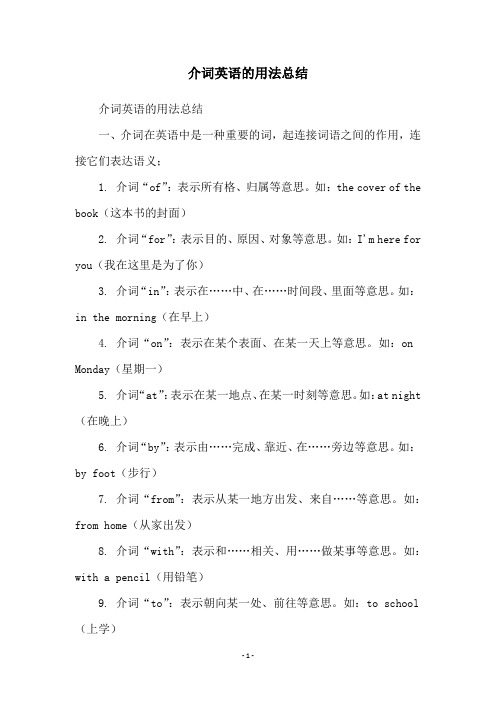
介词英语的用法总结介词英语的用法总结一、介词在英语中是一种重要的词,起连接词语之间的作用,连接它们表达语义;1. 介词“of”:表示所有格、归属等意思。
如:the cover of the book(这本书的封面)2. 介词“for”:表示目的、原因、对象等意思。
如:I'm here for you(我在这里是为了你)3. 介词“in”:表示在……中、在……时间段、里面等意思。
如:in the morning(在早上)4. 介词“on”:表示在某个表面、在某一天上等意思。
如:on Monday(星期一)5. 介词“at”:表示在某一地点、在某一时刻等意思。
如:at night (在晚上)6. 介词“by”:表示由……完成、靠近、在……旁边等意思。
如:by foot(步行)7. 介词“from”:表示从某一地方出发、来自……等意思。
如:from home(从家出发)8. 介词“with”:表示和……相关、用……做某事等意思。
如:with a pencil(用铅笔)9. 介词“to”:表示朝向某一处、前往等意思。
如:to school (上学)10.介词“for”:表示为了……、把……作为等意思。
如:for fun (为了好玩)11.介词“as”:表示作为、当……时等意思。
如:as a teacher (作为一个老师)12.介词“over”:表示在……上、穿过等意思。
如:over the bridge (过桥)13.介词“since”:表示从……起、既然等意思。
如:since then (从那时起)14.介词“into”:表示到……里面、转向等意思。
如:into the room(进房间)二、最后,需要强调的是,介词的使用要灵活搭配,以正确表达出英语句子的意思,以便达到更好的英语表达效果。
英语介词用法大全
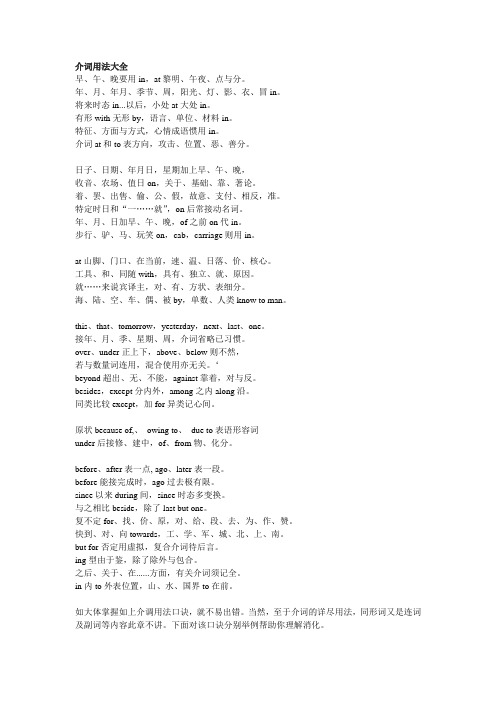
介词用法大全早、午、晚要用in,at黎明、午夜、点与分。
年、月、年月、季节、周,阳光、灯、影、衣、冒in。
将来时态in...以后,小处at大处in。
有形with无形by,语言、单位、材料in。
特征、方面与方式,心情成语惯用in。
介词at和to表方向,攻击、位置、恶、善分。
日子、日期、年月日,星期加上早、午、晚,收音、农场、值日on,关于、基础、靠、著论。
着、罢、出售、偷、公、假,故意、支付、相反,准。
特定时日和“一……就”,on后常接动名词。
年、月、日加早、午、晚,of之前on代in。
步行、驴、马、玩笑on,cab,carriage则用in。
at山脚、门口、在当前,速、温、日落、价、核心。
工具、和、同随with,具有、独立、就、原因。
就……来说宾译主,对、有、方状、表细分。
海、陆、空、车、偶、被by,单数、人类know to man。
this、that、tomorrow,yesterday,next、last、one。
接年、月、季、星期、周,介词省略已习惯。
over、under正上下,above、below则不然,若与数量词连用,混合使用亦无关。
‘beyond超出、无、不能,against靠着,对与反。
besides,except分内外,among之内along沿。
同类比较except,加for异类记心间。
原状because of,、owing to、due to表语形容词under后接修、建中,of、from物、化分。
before、after表一点, ago、later表一段。
before能接完成时,ago过去极有限。
since以来during间,since时态多变换。
与之相比beside,除了last but one。
复不定for、找、价、原,对、给、段、去、为、作、赞。
快到、对、向towards,工、学、军、城、北、上、南。
but for否定用虚拟,复合介词待后言。
ing型由于鉴,除了除外与包合。
史上超全的英语介词用法归纳总结!不看太可惜了
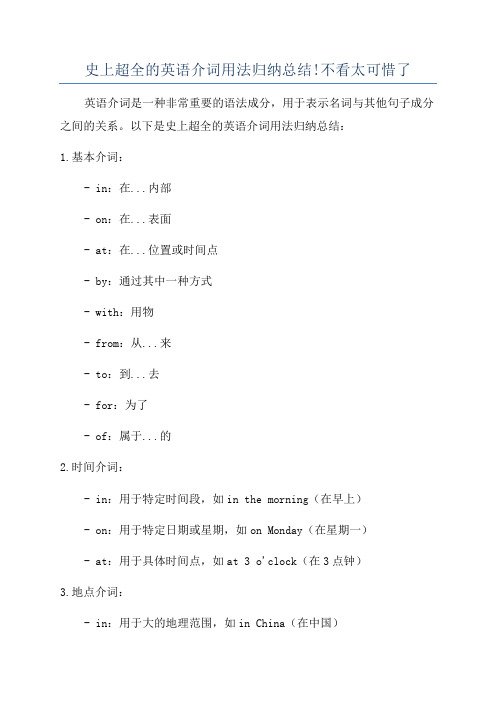
史上超全的英语介词用法归纳总结!不看太可惜了英语介词是一种非常重要的语法成分,用于表示名词与其他句子成分之间的关系。
以下是史上超全的英语介词用法归纳总结:1.基本介词:- in:在...内部- on:在...表面- at:在...位置或时间点- by:通过其中一种方式- with:用物- from:从...来- to:到...去- for:为了- of:属于...的2.时间介词:- in:用于特定时间段,如in the morning(在早上)- on:用于特定日期或星期,如on Monday(在星期一)- at:用于具体时间点,如at 3 o'clock(在3点钟)3.地点介词:- in:用于大的地理范围,如in China(在中国)- on:用于较小的地理范围或表面,如on the street(在街上)- at:用于具体地点,如at the supermarket(在超市)4.方向介词:- to:表示到达一些地方,如go to school(去学校)- into:表示进入一些地方,如go into the house(进入房子)- out of:表示离开一些地方,如get out of the car(离开车)5.原因介词:- because of:由于,如He is late because of the traffic(他因为交通堵塞而迟到)- due to:由于,如The flight was canceled due to bad weather(因为恶劣天气,航班被取消)6.动词短语介词:- look after:照顾,如She looks after her younger brother (她照顾她的弟弟)- take care of:照顾,如He takes care of his plants(他照顾他的植物)7.形容词短语介词:- interested in:对...感兴趣,如She is interested in music (她对音乐感兴趣)- good at:擅长...,如He is good at playing basketball(他擅长打篮球)8.其他常见介词用法:- with regard to:关于,如With regard to the matter, I have something to say(关于这件事,我有些话要说)- instead of:代替,如I will go instead of him(我将代替他去)- according to:根据,如According to the weather forecast, it will rain tomorrow(根据天气预报,明天会下雨)以上是一些常见的英语介词用法总结,希望能帮到你!。
英语中常见介词用法总结
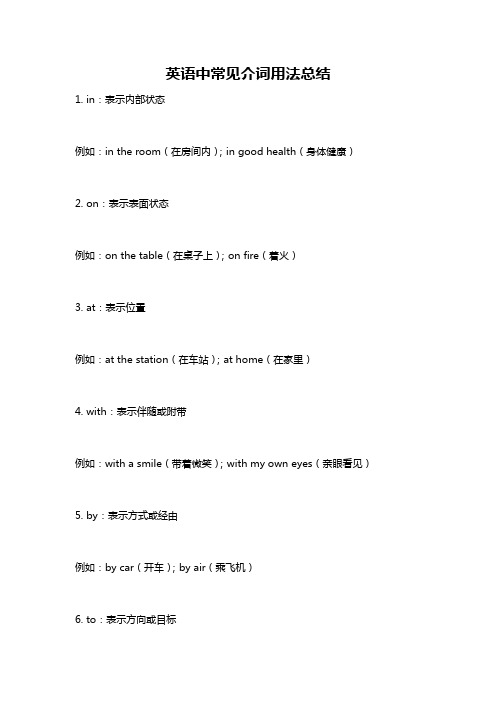
英语中常见介词用法总结
1. in:表示内部状态
例如:in the room(在房间内);in good health(身体健康)2. on:表示表面状态
例如:on the table(在桌子上);on fire(着火)
3. at:表示位置
例如:at the station(在车站);at home(在家里)
4. with:表示伴随或附带
例如:with a smile(带着微笑);with my own eyes(亲眼看见)5. by:表示方式或经由
例如:by car(开车);by air(乘飞机)
6. to:表示方向或目标
例如:to the park(去公园);to the moon(到月球)
7. from:表示出发地或来源
例如:from Beijing(来自北京);from the magazine(从杂志中)
8. for:表示目的或用途
例如:for a birthday party(为了生日派对);for writing(用于写作)
9. of:表示属于或关系
例如:the book of Harry Potter(哈利·波特的书);the sister of Mary(玛丽的姐姐)
10. with:表示具有或伴随
例如:a man with a gun(拿着枪的人);a girl with long hair(长发女孩)。
英语语法:介词用法
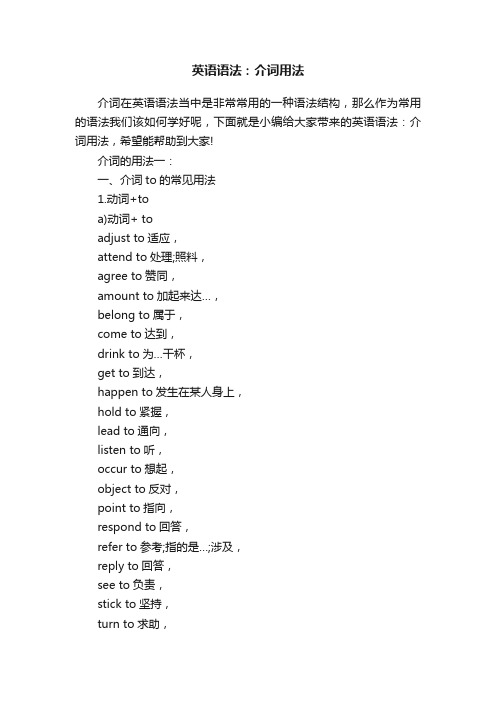
英语语法:介词用法介词在英语语法当中是非常常用的一种语法结构,那么作为常用的语法我们该如何学好呢,下面就是小编给大家带来的英语语法:介词用法,希望能帮助到大家!介词的用法一:一、介词to的常见用法1.动词+toa)动词+ toadjust to适应,attend to处理;照料,agree to赞同,amount to加起来达…,belong to属于,come to达到,drink to为…干杯,get to到达,happen to发生在某人身上,hold to紧握,lead to通向,listen to听,occur to想起,object to反对,point to指向,respond to回答,refer to参考;指的是…;涉及,reply to回答,see to负责,stick to坚持,turn to求助,write to给某人写信。
b)动词(+sth.)+to+sb.announce to通知某人, describe to向某人描述, explain to 向某人解释, express to对某人表达, mention to提及, nod to向某人点头,report to报告,say to告知,shout to对某人大叫,suggest to对某人提建议,speak to与某人交谈,talk to跟某人谈话, whisper to和某人低声耳语。
c)动词+sth./sb.+ to +sth./sb.add to增加, compare to比作, carry to运送至, devote to 致力于,introduce to介绍给, invite to邀请参加, join to连接到,leave to委托给,reduce to下降至, sentence to判处, take to带到。
2. be +形容词/过去分词+ tobe alive to觉察;晓得,be attentive to注意;留心,be awake to知晓,be blind to缺乏眼光,be close to紧挨着,be common to对某人来说很普通,be contrary to违反;反对,be devoted to致力,be deaf to不愿意听,be equal to有…的力量,be exposed to暴露;遭受,be fair to对…公平,be familiar to对某人来说熟悉,be grateful to对某人心存感激,be good to对…有好处,be harmful to对…有危害,be important to对…重要,be kind to友好对待,be known to周知于,be married to嫁给,be moved to转移到,be near to靠近,be necessary to对…有必要,be opposite to在对面,be opposed to反对,be pleasant to合某人之意,be proper to专属,be polite to礼貌待人,be rude to粗暴对待,be relative to与…有关,be strange to不习惯,be similar to类似,be suitable to适合,be true to忠实,be thankful to感激,be useful to对…有用,be used to习惯。
介词用法详解

介词用法详解介词在英语中起着连接句子成分、表示位置、时间、方式等作用。
正确的使用介词对于掌握英语语法和提高英语表达能力非常重要。
本文将详细解析英语常见的介词用法。
一、在时间表示中的用法1. 表示具体时间点:at- I will meet you at 8 o'clock.- I have an appointment at noon.2. 表示时间段:in- We usually go on vacation in summer.- She finished the report in two hours.3. 表示一段时间之前或之后:before / after- I will call you before dinner.- He arrived after the meeting started.二、在地点表示中的用法1. 表示具体地点:at / in / on- She is waiting for you at the bus stop.- The library is in the city center.- The children are playing on the playground.2. 表示方向:to / towards- I walked to the park.- They ran towards the exit.三、在方式表示中的用法1. 表示方式和手段:by- We traveled to Beijing by train.- He sent the document by email.2. 表示交通工具:on / by- I go to work on foot.- She goes to school by bus.四、在原因和目的表示中的用法1. 表示原因:because of- The game was canceled because of the bad weather. - He couldn't attend the party because of his illness.2. 表示目的:for- I bought a gift for my friend's birthday.- We studied hard for the upcoming exam.五、在其他表示中的用法1. 表示关系:of- The book on the table is mine.- The color of the car is blue.2. 表示所属关系:of- The top of the mountain was covered in snow.- The tail of the dog was wagging happily.总结:介词在英语中有着不同的用法,包括时间、地点、方式、原因和目的等方面。
英语介词用法

英语介词用法英语介词:介词是一种用来表示两个词之间关系的词。
在英语中有很多不同的介词,它们大多数都可以分为以下三种类型:1. 地点介词:例如,in(在里面),on(在上面),at(在旁边)。
2. 时间介词:例如,in(在……之内),on(在……的日期),at(在……的时候)。
3. 方向介词:例如,to(去……),from(从……),into(进入……)。
此外,还有一些其它介词,例如,for(为了),over(在……上面),between(在……之间),through(通过……),into (进入……),under(在……下面),among(在……当中),beside(在……旁边),above(在……上方),upon(在……上),across(横穿),behind(在……的背后),toward (朝……),with(使用),around(环绕),inside(在……里面),out of(出),against(反对),up(上)等。
介词用法:介词的使用规则很复杂,但它们的基本用法可以总结为几点:1. 介词和其后的名词或代词必须构成一个完整的意义单位。
例如:Please wait for me。
2. 地点介词和方向介词可以用来连接动词,表示动作发生的地点或方向。
例如:She walked away from the shop。
3. 介词在句子当中可以单独使用,但必须要有后面的名词或代词来构成完整的意义单位。
例如:The student sat in a corner。
4. 介词可以改变名词或代词的某种意义。
例如:She comes from England(来自英格兰),She comes in England(进入英格兰)。
介词使用规则并不固定,只有经过长期的练习和理解,才能将其正确地运用于实际语境中。
学习任何一门语言,都需要一定的练习和实践,只有在日常语言环境中,才能更好地理解和使用它。
英语介词用法归纳总结

英语介词用法归纳总结1.关于时间:- at: 用于具体的时间点,例如at 6 o'clock(在6点),at noon (在中午)- in: 用于较长的时间段,例如in the morning(在早上),inMay(在五月)- on: 用于具体的日期或特殊的时间,例如on Monday(在星期一),on Christmas Day(在圣诞节)2.关于地点:- at: 用于具体的地址或地点,例如at home(在家),at the cinema(在电影院)- in: 用于大的地理区域或封闭区域,例如in London(在伦敦),in the park(在公园)- on: 用于具体的路线或表面,例如on the street(在街上),on the table(在桌子上)3.关于方式和原因:- by: 表示通过其中一种方式或方法,例如by bus(乘坐公交车),by email(通过电子邮件)- for: 表示出于其中一种目的或原因,例如for fun(为了好玩),for health(为了健康)4.关于原因和目的:- for: 表示给予或服务于人或物,例如a gift for you(给你的礼物),a book for studying(用于学习的书籍)- to: 表示朝向人或地,例如go to school(去学校),give something to someone(给人东西)5.关于关系和方向:- at: 用于指定位置,例如at the corner(在拐角处),at thetop(在顶部)- in: 用于被围绕或包围的地方,例如in the box(在盒子里),in the car(在车里)- on: 用于接触或依靠的表面,例如on the wall(在墙上),onthe floor(在地板上)6.关于运动和位置:- into: 表示进入一些地方,例如go into the room(进入房间),jump into the water(跳入水中)- out of: 表示离开一些地方,例如get out of the car(从车里出来),jump out of the window(从窗户跳出)7.其他常见用法:- with: 表示伴随或携带人或物,例如go with friends(和朋友一起去),a bag with books(带有书的袋子)- by: 表示通过其中一种交通工具或方法,例如by train(乘坐火车),by walking(步行)- to: 表示给予人或处,例如give something to someone(给人东西),send a message to a friend(给朋友发消息)以上是一些常见的英语介词用法归纳总结,但是要注意,有些介词的用法是可以根据具体语境变化的,所以需要根据具体情况来选择合适的介词使用。
40个英语介词用法总结
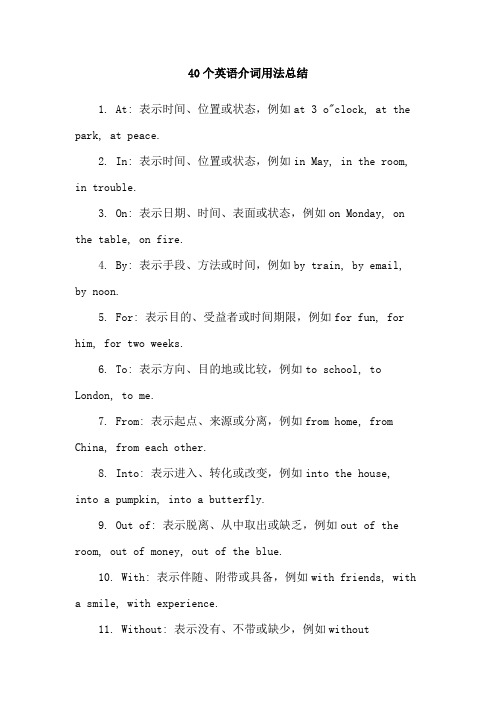
40个英语介词用法总结1. At: 表示时间、位置或状态,例如at 3 o"clock, at the park, at peace.2. In: 表示时间、位置或状态,例如in May, in the room, in trouble.3. On: 表示日期、时间、表面或状态,例如on Monday, on the table, on fire.4. By: 表示手段、方法或时间,例如by train, by email, by noon.5. For: 表示目的、受益者或时间期限,例如for fun, for him, for two weeks.6. To: 表示方向、目的地或比较,例如to school, to London, to me.7. From: 表示起点、来源或分离,例如from home, from China, from each other.8. Into: 表示进入、转化或改变,例如into the house,into a pumpkin, into a butterfly.9. Out of: 表示脱离、从中取出或缺乏,例如out of the room, out of money, out of the blue.10. With: 表示伴随、附带或具备,例如with friends, witha smile, with experience.11. Without: 表示没有、不带或缺少,例如withoutpermission, without shoes, without doubt.12. Over: 表示覆盖、超过或结束,例如over the roof, over the limit, over and done with.13. Under: 表示在下面、被支配或不足,例如under the table, under his control, under budget.14. About: 表示关于、大约或忙于,例如about the movie, about 10 dollars, about to leave.15. Above: 表示在上面、高于或超过,例如above the clouds, above average, above suspicion.16. Below: 表示在下面、低于或不足,例如below the surface, below freezing, below par.17. Across: 表示横穿、相交或涉及,例如across the street, across the board, across his mind.18. Beyond: 表示超出、远离或除了,例如beyond repair, beyond belief, beyond her control.19. Around: 表示周围、附近或环绕,例如around the corner, around the clock, around the world.20. Before: 表示以前、在前面或比较,例如before noon, before the house, before his time.21. Behind: 表示在后面、落后或背后,例如behind the house, behind schedule, behind the scenes.22. Beside: 表示在旁边、与...相比或附加,例如besidethe river, beside myself, beside the point.23. Inside: 表示内部、在里面或被包含,例如inside the box, inside the building, inside information.24. Outside: 表示外部、在外面或超出,例如outside the house, outside the box, outside the norm.25. Through: 表示穿过、经过或完成,例如through the door, through the park, through with it.26. Throughout: 表示遍布、贯穿或在整个期间,例如throughout the city, throughout history, throughout the day.27. Towards: 表示朝向、对于或接近,例如towards the sun, towards him, towards the end.28. Against: 表示反对、抵抗或紧挨着,例如against the law, against the current, against the wall.29. Among: 表示在...之中、相互之间或被分配到,例如among friends, among the stars, among the winners.30. Between: 表示在两者之间、在中间或相互之间,例如between two trees, between classes, between you and me.31. Within: 表示在内部、在范围之内或在规定时间内,例如within the house, within the budget, within a week.32. Without: 表示在外面、没有或不用,例如without the room, without a doubt, without further ado.33. Beneath: 表示在下面、低于或不足,例如beneath the surface, beneath his dignity, beneath contempt.34. Beside: 表示在旁边、与...相比或附加,例如beside the river, beside myself, beside the point.35. Into: 表示进入、转化或改变,例如into the house, into a pumpkin, into a butterfly.36. Upon: 表示在...之上、一旦发生或基于,例如upon the hill, upon arrival, upon further consideration.37. With: 表示伴随、附带或具备,例如with friends, witha smile, with experience.38. Within: 表示在内部、在范围之内或在规定时间内,例如within the house, within the budget, within a week.39. Without: 表示没有、不带或缺少,例如without permission, without shoes, without doubt.40. Beneath: 表示在下面、低于或不足,例如beneath the surface, beneath his dignity, beneath contempt.。
英语语法介词用法
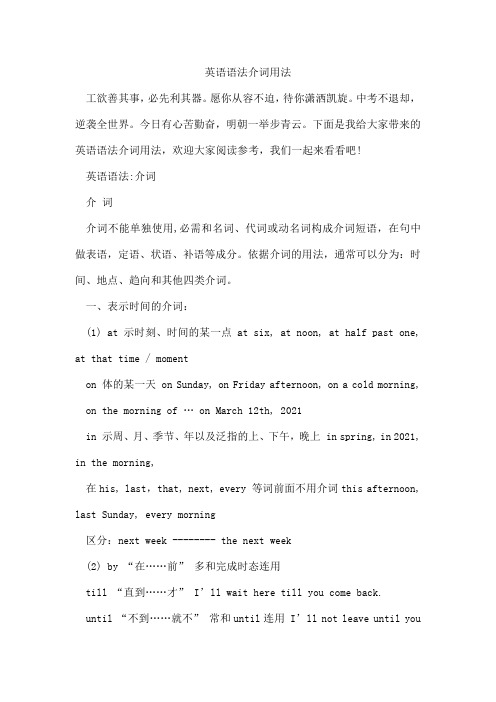
英语语法介词用法工欲善其事,必先利其器。
愿你从容不迫,待你潇洒凯旋。
中考不退却,逆袭全世界。
今日有心苦勤奋,明朝一举步青云。
下面是我给大家带来的英语语法介词用法,欢迎大家阅读参考,我们一起来看看吧!英语语法:介词介词介词不能单独使用,必需和名词、代词或动名词构成介词短语,在句中做表语,定语、状语、补语等成分。
依据介词的用法,通常可以分为:时间、地点、趋向和其他四类介词。
一、表示时间的介词:(1) at 示时刻、时间的某一点 at six, at noon, at half past one, at that time / momenton 体的某一天 on Sunday, on Friday afternoon, on a cold morning, on the morning of … on March 12th, 2021in 示周、月、季节、年以及泛指的上、下午,晚上 in spring, in 2021, in the morning,在his, last,that, next, every 等词前面不用介词this afternoon, last Sunday, every morning区分:next week -------- the next week(2) by “在……前” 多和完成时态连用till “直到……才” I’ll wait here till you come back.until “不到……就不” 常和until连用I’ll not leave until youcome back.(3) in 过……以后, 大多用于将来时 after 多用于过去时(4) since + 过去的一个时间点 (表示时间段, 从……开头到现在) for + 一段时间二、表示场所、方向的介词:(1)at 表示比较详细的地点 at 37 Renming Roadin 表示比较宽敞的地点 in Renming Street(2)above斜上方-------below斜下方 over正上方-------under正下方on 两物体有接触(3) be tween…and..在……和……之间 among在……中间(三者以上)(4) across (从物体表面)跨越, 越过 through (从物体中间)穿透, 穿越(5)in 在……里面(表示静止的位置) into 进入,表示运动方向,常用在表示动作的动词之后, 如 go, come, walk, jump, run 等 into的反义词是out of(6)to 到 (目底地)或方向 towards 指朝着某方向,而不是目的地.He walked towards the beach.三、其它介词1.with (1)在一起; (2)有; (3)用某种工具in 用什么材料或语言,或表示衣着,声调特点等by 用......手段2.Like 象......一样as 作为;根据,象......一样(连词)+ 句子3.for(1)为了(表示目的或缘由) (2)(后面加一段时间)表示时间段英语中考:介词短语[介词短语聚焦]“介词+名词/代词”所构成的短语称为介词短语。
英语介词用法大全
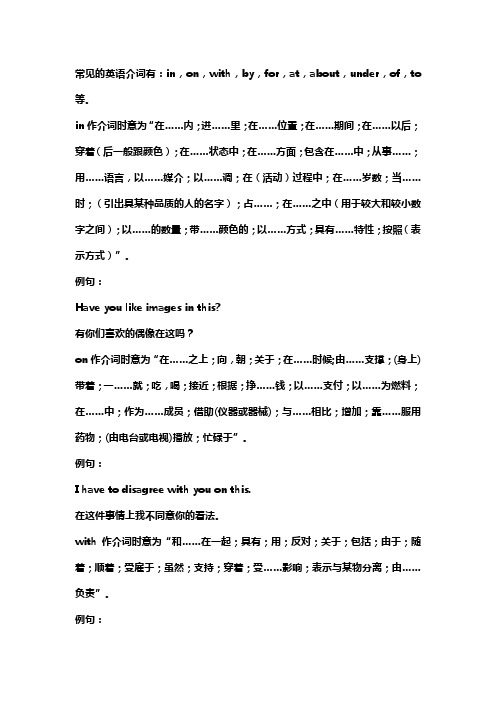
常见的英语介词有:in,on,with,by,for,at,about,under,of,to 等。
in作介词时意为“在……内;进……里;在……位置;在……期间;在……以后;穿着(后一般跟颜色);在……状态中;在……方面;包含在……中;从事……;用……语言,以……媒介;以……调;在(活动)过程中;在……岁数;当……时;(引出具某种品质的人的名字);占……;在……之中(用于较大和较小数字之间);以……的数量;带……颜色的;以……方式;具有……特性;按照(表示方式)”。
例句:Have you like images in this?有你们喜欢的偶像在这吗?on作介词时意为“在……之上;向,朝;关于;在……时候;由……支撑;(身上)带着;一……就;吃,喝;接近;根据;挣……钱;以……支付;以……为燃料;在……中;作为……成员;借助(仪器或器械);与……相比;增加;靠……服用药物;(由电台或电视)播放;忙碌于”。
例句:I have to disagree with you on this.在这件事情上我不同意你的看法。
with作介词时意为“和……在一起;具有;用;反对;关于;包括;由于;随着;顺着;受雇于;虽然;支持;穿着;受……影响;表示与某物分离;由……负责”。
例句:I am one with you on this.在这一点上,我和你的意见是一致的。
by作介词时意思是“由,被;通过;相差……;到……之前;在……旁边”。
例句:The telephone is by the window.电话在窗户旁边。
for作介词的时候,它翻译为“(表示对象、用途等)给,对;为了;关于;代表;受雇于;意思是;支持;因为;为得到;换取;就……而言;……后(更好、更快乐等);(表示去向)往;(安排或预定)在……时;对(某人)来说(困难、必需、愉快等);以……为价格;(表示一段时间)计;表示一系列事件之一。
例句:Can you translate this letter for me?你能为我翻译这封信吗?at(表示位置)在;在(某时间或时刻);以,达;向,朝。
英语介词用法最全总结
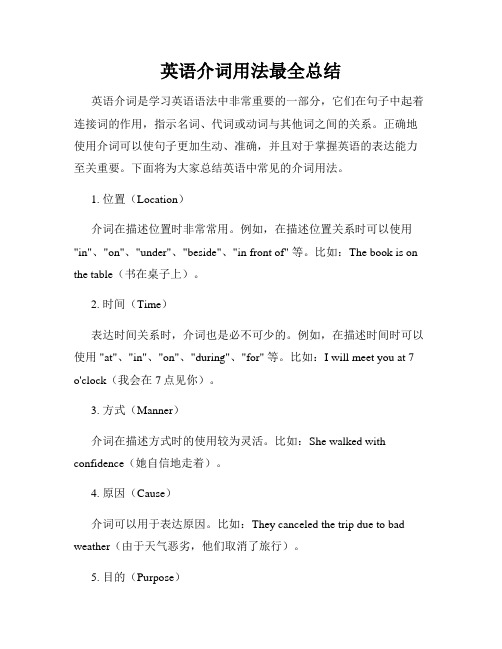
英语介词用法最全总结英语介词是学习英语语法中非常重要的一部分,它们在句子中起着连接词的作用,指示名词、代词或动词与其他词之间的关系。
正确地使用介词可以使句子更加生动、准确,并且对于掌握英语的表达能力至关重要。
下面将为大家总结英语中常见的介词用法。
1. 位置(Location)介词在描述位置时非常常用。
例如,在描述位置关系时可以使用"in"、"on"、"under"、"beside"、"in front of" 等。
比如:The book is on the table(书在桌子上)。
2. 时间(Time)表达时间关系时,介词也是必不可少的。
例如,在描述时间时可以使用 "at"、"in"、"on"、"during"、"for" 等。
比如:I will meet you at 7 o'clock(我会在7点见你)。
3. 方式(Manner)介词在描述方式时的使用较为灵活。
比如:She walked with confidence(她自信地走着)。
4. 原因(Cause)介词可以用于表达原因。
比如:They canceled the trip due to bad weather(由于天气恶劣,他们取消了旅行)。
5. 目的(Purpose)介词也能表达目的。
比如:He went to the store to buy some groceries (他去商店买些食品)。
6. 所属关系(Possession)介词可以用于表达所属关系。
比如:This book belongs to me(这本书是我的)。
7. 比较(Comparison)在进行比较时,介词也可以派上用场。
比如:I am taller than my sister(我比我妹妹高)。
英语介词的用法
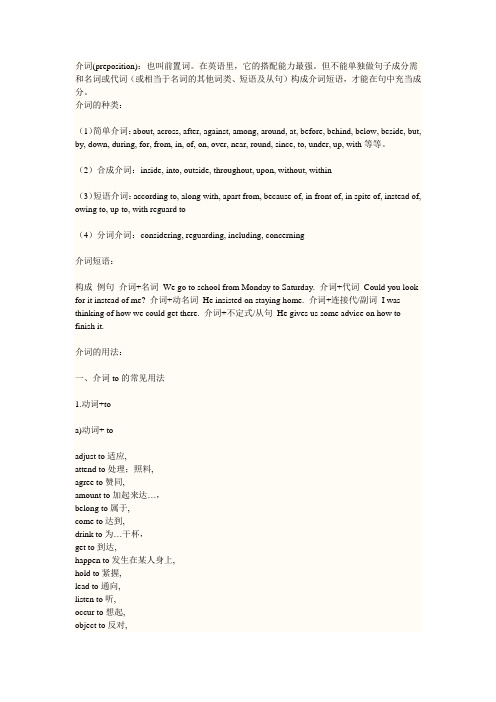
介词(preposition):也叫前置词。
在英语里,它的搭配能力最强。
但不能单独做句子成分需和名词或代词(或相当于名词的其他词类、短语及从句)构成介词短语,才能在句中充当成分。
介词的种类:(1)简单介词:about, across, after, against, among, around, at, before, behind, below, beside, but, by, down, during, for, from, in, of, on, over, near, round, since, to, under, up, with等等。
(2)合成介词:inside, into, outside, throughout, upon, without, within(3)短语介词:according to, along with, apart from, because of, in front of, in spite of, instead of, owing to, up to, with reguard to(4)分词介词:considering, reguarding, including, concerning介词短语:构成例句介词+名词We go to school from Monday to Saturday. 介词+代词Could you look for it instead of me? 介词+动名词He insisted on staying home. 介词+连接代/副词I was thinking of how we could get there. 介词+不定式/从句He gives us some advice on how to finish it.介词的用法:一、介词to的常见用法1.动词+toa)动词+ toadjust to适应,attend to处理;照料,agree to赞同,amount to加起来达…,belong to属于,come to达到,drink to为…干杯,get to到达,happen to发生在某人身上,hold to紧握,lead to通向,listen to听,occur to想起,object to反对,point to指向,respond to回答,refer to参考;指的是…;涉及,reply to回答,see to负责,stick to坚持,turn to求助,write to给某人写信。
英语介词用法大全

英语介词用法大全一、介词preposition缩写prep,又叫前置词,表示其后的名词或代词(或是相当于名词的其他短语或从句)与其他句子成分的关系。
介词是一种虚词,不能单独在句中作成分。
二. 常用介词用法区分:1、in, on, to表示地理位置:in表示在某范围内,on指与什么毗邻,to指在某环境范围之外;2、on, in表示“在…上”时:on只表示在某物的表面上,in表示占去某物一部分;3、through, across都表示“穿过”时:through表示从内部通过,与in有关,across表示在表面上通过,与on有关;4、since, from表示表示时间时:since 指从过去到现在的一段时间,和完成时连用,from指从时间的某一点开始;5、in, on, at表示时间时:at表示片刻的时间,in表示一段的时间,on总是与日子有关;6、in, after表示时间时:in指在一段时间之后,after表示某一具体时间点之后或用在过去时的一段时间中;7、about, on表示“关于”时:about指涉及到,on指专门论述;8、besides与except表示“除了”:besides指“除了…还有再加上”,except指“除了,减去什么”,不放在句首;9、between与among表示“在两者之间”:between表示在两者之间,among用于三者或三者以上的中间;10、in, with表示“用”时:with表示具体的工具,in表示材料,方式,方法,度量,单位,语言,声音;11、in与into表示在里面:in通常表示位置(静态),into表示动向,不表示目的地或位置。
12、as与like:as意为“作为,以…地位或身份”,like为“象…一样”,指情形相似;三、介词用法口诀1、年月周前要用in,遇到几号用on,上午下午又是in.要说某日上下午,on换成in,午夜黄昏用at,黎明用它也不借。
at也在时分前,说“差”要用to,说“过”用part。
英语 介词用法
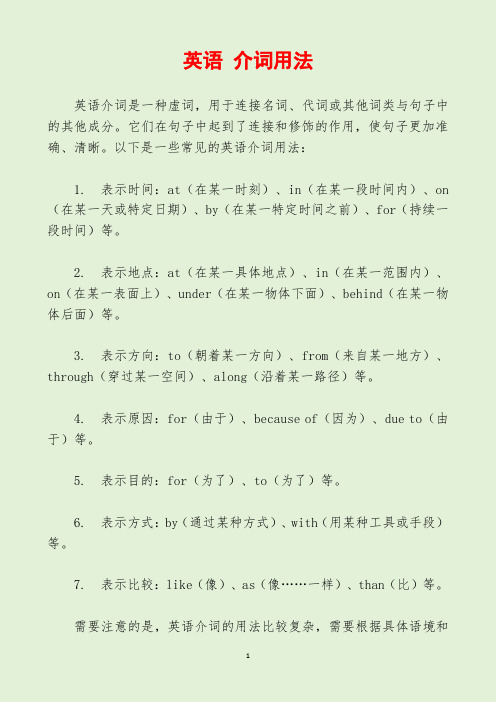
英语介词用法
英语介词是一种虚词,用于连接名词、代词或其他词类与句子中的其他成分。
它们在句子中起到了连接和修饰的作用,使句子更加准确、清晰。
以下是一些常见的英语介词用法:
1. 表示时间:at(在某一时刻)、in(在某一段时间内)、on (在某一天或特定日期)、by(在某一特定时间之前)、for(持续一段时间)等。
2. 表示地点:at(在某一具体地点)、in(在某一范围内)、on(在某一表面上)、under(在某一物体下面)、behind(在某一物体后面)等。
3. 表示方向:to(朝着某一方向)、from(来自某一地方)、through(穿过某一空间)、along(沿着某一路径)等。
4. 表示原因:for(由于)、because of(因为)、due to(由于)等。
5. 表示目的:for(为了)、to(为了)等。
6. 表示方式:by(通过某种方式)、with(用某种工具或手段)等。
7. 表示比较:like(像)、as(像……一样)、than(比)等。
需要注意的是,英语介词的用法比较复杂,需要根据具体语境和
句子结构来判断使用哪一个介词。
在学习和使用介词时,需要多读多练,逐渐掌握其用法。
英语中所有介词的用法
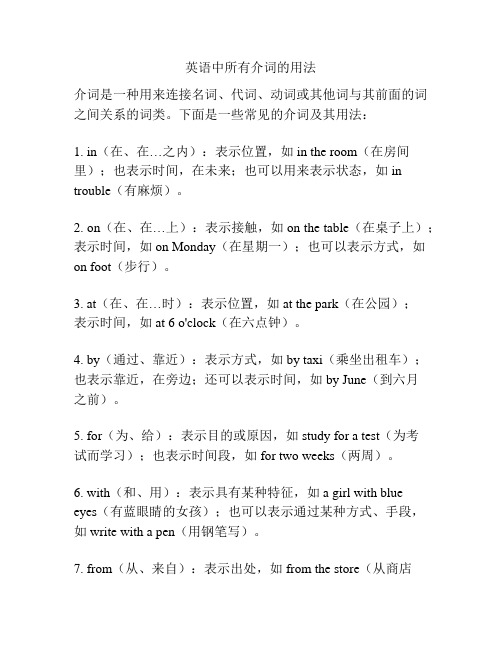
英语中所有介词的用法
介词是一种用来连接名词、代词、动词或其他词与其前面的词之间关系的词类。
下面是一些常见的介词及其用法:
1. in(在、在…之内):表示位置,如in the room(在房间里);也表示时间,在未来;也可以用来表示状态,如in trouble(有麻烦)。
2. on(在、在…上):表示接触,如on the table(在桌子上);表示时间,如on Monday(在星期一);也可以表示方式,如on foot(步行)。
3. at(在、在…时):表示位置,如at the park(在公园);
表示时间,如at 6 o'clock(在六点钟)。
4. by(通过、靠近):表示方式,如by taxi(乘坐出租车);也表示靠近,在旁边;还可以表示时间,如by June(到六月
之前)。
5. for(为、给):表示目的或原因,如study for a test(为考
试而学习);也表示时间段,如for two weeks(两周)。
6. with(和、用):表示具有某种特征,如a girl with blue
eyes(有蓝眼睛的女孩);也可以表示通过某种方式、手段,
如write with a pen(用钢笔写)。
7. from(从、来自):表示出处,如from the store(从商店
里);表示起点,如from London(从伦敦)。
8. to(到、向):表示目的地,如go to school(去学校);表示方向,如face to the north(面朝北方)。
这只是一部分介词的使用方法,介词的用法还有很多,需要根据具体语境来理解和运用。
介词 超全的英语介词用法归纳总结~优秀6篇
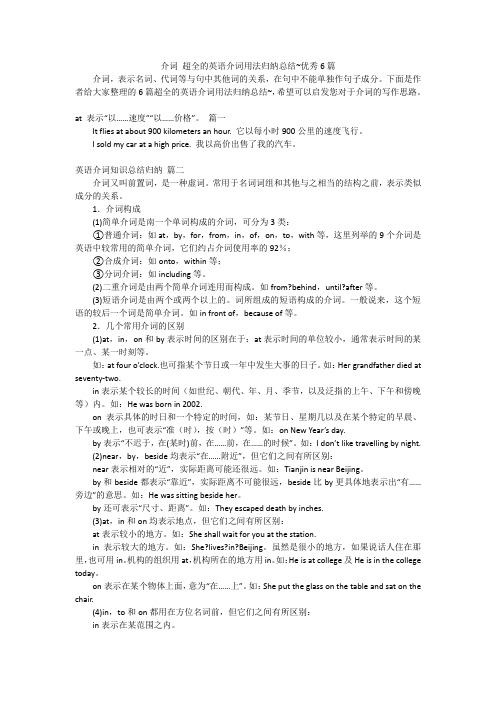
介词超全的英语介词用法归纳总结~优秀6篇介词,表示名词、代词等与句中其他词的关系,在句中不能单独作句子成分。
下面是作者给大家整理的6篇超全的英语介词用法归纳总结~,希望可以启发您对于介词的写作思路。
at 表示“以……速度”“以……价格”。
篇一It flies at about 900 kilometers an hour. 它以每小时900公里的速度飞行。
I sold my car at a high price. 我以高价出售了我的汽车。
英语介词知识总结归纳篇二介词又叫前置词,是一种虚词。
常用于名词词组和其他与之相当的结构之前,表示类似成分的关系。
1.介词构成(1)简单介词是南一个单词构成的介词,可分为3类:①普通介词:如at,by,for,from,in,of,on,to,with等,这里列举的9个介词是英语中较常用的简单介词,它们约占介词使用率的92%;②合成介词:如onto,within等;③分词介词:如including等。
(2)二重介词是由两个简单介词连用而构成。
如from?behind,until?after等。
(3)短语介词是由两个或两个以上的。
词所组成的短语构成的介词。
一般说来,这个短语的较后一个词是简单介词。
如in front of,because of等。
2.几个常用介词的区别(1)at,in,on和by表示时间的区别在于:at表示时间的单位较小,通常表示时间的某一点、某一时刻等。
如:at four o’clock.也可指某个节日或一年中发生大事的日子。
如:Her grandfather died at seventy-two.in表示某个较长的时间(如世纪、朝代、年、月、季节,以及泛指的上午、下午和傍晚等)内。
如:He was born in 2002.on表示具体的时日和一个特定的时间,如:某节日、星期几以及在某个特定的早晨、下午或晚上,也可表示“准(时),按(时)”等。
- 1、下载文档前请自行甄别文档内容的完整性,平台不提供额外的编辑、内容补充、找答案等附加服务。
- 2、"仅部分预览"的文档,不可在线预览部分如存在完整性等问题,可反馈申请退款(可完整预览的文档不适用该条件!)。
- 3、如文档侵犯您的权益,请联系客服反馈,我们会尽快为您处理(人工客服工作时间:9:00-18:30)。
介词一、介词的定义介词是一类虚词,不能独立作句子成分,必须与名词或代词等词类一起构成介词短语,才可以充当句子成分。
介词在句子中一般不重读。
二、介词的种类l.简单介词例如:at,in,on,under,of,after,over,past等。
2.复合介词例如:into,onto,throughout,without,within,nearby等。
3.短语介词例如:in front of,because of,instead of,according to,out of等。
三、介词短语的用法1.在句子中作表语Between my school and the zoo is a stone bridge.在我的学校与动物园之间是一座石桥。
Mary and John are from Australia.玛丽和约翰来自澳大利亚。
Our school is in front of the factory.我们的学校就在那个工厂的前面。
2.在句子中充当后置定语The young man under the tree is my friend Li Ming.那个在树下的年轻人是我的朋友李明。
China is a country with a long history.中国是具有悠久历史的国家。
This is not the key to the door.这不是那扇门的钥匙。
3.在句子中作状语My mother looks younger for her age.我妈妈显得比实际年龄更年轻。
Our library keeps open from eight o'clock in the morning to nine o'clock in the evening.我们图书馆从上午8:00到晚上9:00都开门。
4.在句子中作宾语补足语We all think Li Mei as a good girl.我们都把李梅看作是一个好姑娘。
She found herself in a strange room when she woke up.她醒来时发现自己在一个陌生的房间里。
5. 在句子中作介词的宾语The policeman took the picture from under the book.警察从那本书的下面把照片取了出来。
It's said that the secret is from inside the well.据说秘密来自这口井的里面。
四、表示时间的介词。
l. at, on, in(1)at用于表示某一具体时刻或时间点。
例如:at night 在夜晚at noon 在中午at midnight 在午夜at ten o' clock在十点钟at Christmas在圣诞节at present在目前(2)on指“具体的某一天或某天的上午、下午、晚上”,在重大节日前也可用on。
例如:on a cold day 在一个寒冷的日子on Sunday 在星期天on the morning of Oct.1st在十月一日的早晨on September l0th 在九月十号on Christmas Eve在圣诞前夜on Monday evening 在星期一晚上年、月、日表示法:无“日”添上“in”,有“日”就用“on”。
(3)in表示周、月、季节、年或泛指上午、下午、晚上。
例如:in a week 在一周内in February 在二月in spring 在春季in the day 在白天in 2004 在2004年泛指上午、下午、晚上时,用in, 特指某一日的上午、下午、晚上时,用on.in the evening 在晚上on Sunday evening 在周日晚上注意英语中时间状语不用介词的情况很多,现归纳如下:①在this, that, these等组成的词组前不用介词。
如:We are in Grade Two this year.今年我们上二年级。
Bob's wife told him that he had forgotten his wallet that morning.鲍勃的妻子告诉他,他那天早晨忘带钱包了。
Tom's trouble is very common to boys these days.汤姆的问题这些天在男孩们中间很常见。
②由next或last构成的词组前不用介词。
如:When did you go to bed last night?你昨晚几点上床睡觉的?The next day she got up early and went to school without breakfast.第二天她起得很早,没吃早饭就去了学校。
③当yesterday,tomorrow用作副词或由它们构成的短语前不用介词。
如:Can you be here at eight tomorrow morning?你明早八点能在这里吗?Were you at home yesterday evening?你昨晚在家吗?④在含有a,one,every,some,all等词的短语前不用介词。
如:One day the woman learned that Liszt himself Was in town.一天妇人听说李斯特本人就在镇上。
I hope to go to the moon some day.我希望有一天去月球。
2. before, after(1)before表示“在某时刻或某件事之前”。
例如:He must be at home before 5:00 pm.下午五点之前他一定在家。
Check your papers carefully before handing them in. 在交卷之前,仔细检查你的试卷。
(2)after表示“在某时刻或某件事之后”。
例如:After breakfast she hurried to school。
早饭后,她匆忙上学去了。
Call me at once after you get there.到那儿之后马上给我打电话。
She came here after me.她在我之后来这儿。
3.by, until (till)(1)by表示“在……之前;到……为止”。
例如:You must finish your job by six o'clock.你必须在六点之前完成这项工作。
By the time he got here,the meeting had been over.他到这儿时,会议已结束了。
We had learned 5,000 words by the end of last year.到去年年底为止,我们已学了五千多单词。
(2)until(till)”表示“直到……才…….”。
例如:She didn't go home until lunch time.直到午饭时间她才回家。
We waited until 10 o'clock last night.昨晚我们一直等到十点钟。
注意:until 与瞬间动词(点动词)连用时,必须用否定式;而与延续性动词连用时,用肯定式。
My father didn’t buy me a bike until last week.我父亲直到上星期才给我买了一辆自行车。
(buy 是瞬间动词,所以用否定)You can keep this book till next month.这本书你可以借到下个月。
(keep是延续性动词,用肯定式)4.from, since(1) from表示“从……时起”。
一般都是用词组from……to…,from用于现在时,过去时和将来时。
例如:from ten o'clock to twelve o'clock从十点到十二点from this year 从今年开始from Sunday 从星期天开始from day to night 从白天到黑夜The meeting will be held from eight to ten.这个会议将从8点开到10点。
(2)since表示“自过去某一时刻或行为以来”。
经常用于含有完成时的句子里,后面跟过去某一时间点;since还可以用作副词和连词。
例如:They came to Beijing in 1950 and have lived here since then.一九五O年他们来到北京,以后就一直住在这儿。
He's worked on the farm since he left the army.(自从)他离开部队以来,一直在农场工作。
5.for,during, through(1)for引导一段时间,强调时间由始至终,可译为“(时间)长达……”,一般与有长度的时间短语连用,如for three weeks, for a long time 等,可用于现在(过去)完成时或过去时的句子里。
例如:He studied English for three years.他学了三年英语。
The French teacher has been in China for about a month.这位法国老师在中国已经大约一个月了。
(2)during意为“在……期间”,与一段时间的整体连用。
如:during the spring, during last year, during l980等,也可以和表示延续性事件的名词连用,如during my childhood.during our stay, during his visit等,一般不用于现在完成时的句子里。
例如:During the winter we play football.冬季我们踢足球。
Many comrades went to see him during his illness.在他生病期间许多同志去看望了他。
(3)through表示“从……开始到……结束(全过程)”例如:It is very hot through the whole summer this year.今年整个夏季都很热。
6.in, within(1)in表示“过……之后”,多用于将来时(一般将来时和过去将来时)例如:in ten minutes 十分钟之后in two weeks 两周之后The delegation will arrive in three days.代表团将于三天后到达。
They said they would return home in a week.他们说他们一周后回家。
